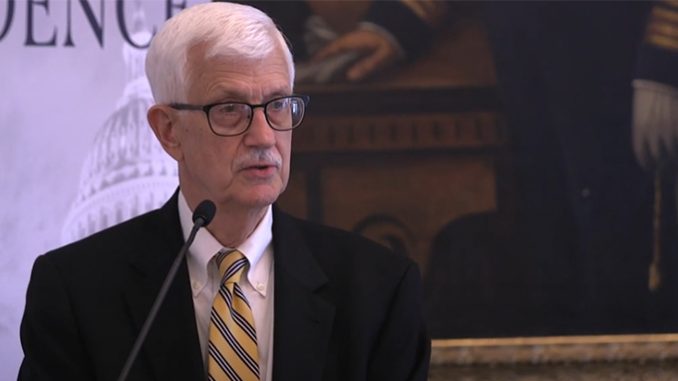
Washington, D.C. — The Religious Freedom Institute (RFI) honored Dr. Thomas Farr with its prestigious “Defender of Religious Freedom Award” on Monday, recognizing his lifelong commitment to promoting religious liberty. A devout Catholic and former Army officer, Farr has had a distinguished career that spans public service, academia, and advocacy, all united by his belief that “the truth sets us free.”
The award ceremony, held at the Mayflower Hotel in Washington, D.C., featured a keynote address by George Weigel, who celebrated Farr’s decades-long dedication to safeguarding religious freedom both in the U.S. and around the world. Reflecting on the symbolism of the date, Weigel linked Farr’s work to the fall of the Berlin Wall in 1989—a moment that embodied a “revolution of conscience” against oppression. He described Farr’s efforts as part of a larger struggle to protect freedom of conscience and civil liberties, likening them to the peaceful resistance that ultimately toppled communist regimes in Eastern Europe.
For Farr, religious freedom is a foundational right essential to all other civil liberties. Weigel noted that Farr’s “conviction that the truth sets us free” has driven his career through various roles in the Army, the Foreign Service, academia, and think tanks. This belief, Weigel argued, stands in stark contrast to the prevailing attitudes within parts of the foreign policy establishment that often overlook the profound role of religious conviction in shaping international affairs.
Farr’s contributions include founding the Office of International Religious Freedom at the U.S. State Department, a position he took up despite bureaucratic resistance. His work in the newly established office, which he directed, involved advocating for the importance of religious liberty as a critical human right and a component of stable governance worldwide. Farr has also led the Religious Freedom Institute since its inception, educating military and diplomatic officials on the value of religious freedom as a stabilizing force in global politics.
Farr’s influence has been felt in many circles beyond government, as he continues to advocate for religious freedom as a cornerstone of civil society. Weigel highlighted Farr’s unique ability to navigate both academic and policy environments, combining deep intellect with political acumen and the grace of a “Southern gentleman.”
In his remarks, Weigel underscored that Farr’s career exemplifies an “I have it to do” mindset—taking on challenges not because he must, but because he feels morally obligated. He praised Farr’s perseverance and courage, stating, “Our country owes him an enormous debt of gratitude.”
Though today’s world remains fraught with challenges to religious liberty, the work of advocates like Thomas Farr ensures that this “first freedom” remains a central focus in global human rights discussions. Through his tireless work, Farr has not only impacted policy but also inspired a generation to carry forward the fight for freedom of conscience.
Concluding his speech, Weigel affirmed the critical role of defenders like Farr: “As long as there are Americans like Tom Farr who are willing to lead the defense of religious freedom, our country will remain true to its best self.”